 When she hit her 40s, Anne started to feel dissatisfied with the rat race of consulting, along with the material trappings she had accumulated. She sold it all to work and live in Haiti, helping grow Fonkoze, the island nation’s bank for the poor.
When she hit her 40s, Anne started to feel dissatisfied with the rat race of consulting, along with the material trappings she had accumulated. She sold it all to work and live in Haiti, helping grow Fonkoze, the island nation’s bank for the poor.
Tell us a little about your background…
I grew up in a family with four children in a small town in Virginia called Winchester. I was the third child of a stay-at-home mom and a dad who was a physician. I loved horseback riding and always did well in school. When I was looking at colleges, I wanted to go to the University of Virginia, but at that time, they didn’t accept women! So I applied to University of North Carolina where my brother had been a Morehead Scholar. I was rejected because that year they only accepted 18 out-of-state women and they all had fathers who had been Morehead Scholars! So I was forced to go to Duke, which of course I loved. On the drive to school with my father, I said to him, “If I don’t find a husband in the first year, I’m going to drop out and go to secretarial school.” Can you imagine?
Once at Duke, my life changed dramatically. During my first year, I became sensitized to the women’s movement, the struggle for civil rights, and the war in Vietnam. I joined a women’s group, marched against the war, and came to terms with having grown up in the South. In my last year, I fell in love with a man who was headed to the University of Michigan to get a law degree. For a while, I too thought about law, but I ultimately rejected that idea. We got married a year later and in 1975 had a son, Corey.

With Corey
I went on to get a Ph.D. from the University of Virginia in public policy (education and health) after receiving a fellowship at the Brookings Institution to write my dissertation. About that time, my husband and I went through a divorce but I was very proud of the fact that we had a joint custody agreement for the care of our son, and we always lived within a mile or two of one another so that it was easy for Corey to move from his dad’s home to my home. I remarried once, but that marriage didn’t work out either.
Following my graduate work, I got a job at a big consulting firm in the Washington, DC area. My work was primarily with the federal government but I moved relatively quickly into management consulting. After a few years, I left the company to set up my own consulting firm with my business partner, John Scanlon.
I loved my work with so many different government agencies and nonprofits in the health care and education worlds because of the diversity—I was always learning something new—and the fabulous collegial relationship I had with my business partner. But over the years, I began to get frustrated by the difficulty of making real change in the organizations that hired us. We might work with the same agency for several years and reach consensus with both the agency leadership and the employees, but in Washington, DC there was always some stakeholder either inside or outside the agency who didn’t want the change to happen and would find a way to block it. It began to feel like I wasn’t really able to accomplish anything very meaningful.
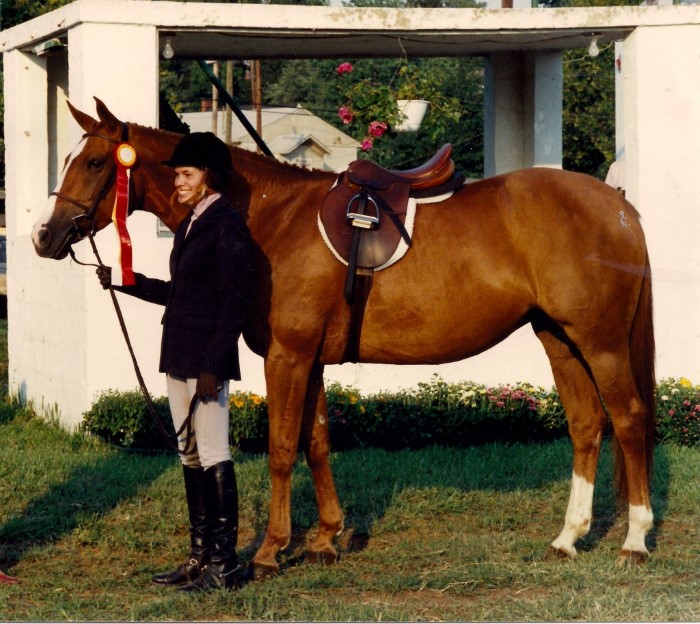
With my horse in my late 30s
When did you start to think about making a change?
After about 15 years of consulting, as I was making my way through my 40s, I began to feel like my life was becoming just too complicated. I had a house that was bigger than I needed, a car that was more expensive than I needed, and clothes that only served to make more money so I could buy more of them! The rat race, combined with the feeling that I wasn’t accomplishing anything meaningful began to take its toll.
I decided to start doing volunteer work and, because I believed very strongly in the hospice movement, I volunteered at an inpatient hospice unit in D.C. that at that time was full of people dying of AIDS. My job was just to talk to the patients, perhaps give them a lotion massage or help them eat. And, once they died, I helped the nurses prepare the bodies for transport to the morgue. I only went once or twice a week, but I began to realize that my time with these people was more important to me than my work. Wow! What did that mean?
Ultimately, I decided to apply to the Peace Corps; my hope was that I could do relief work in Africa. It took over a year to go through the application process, but I was finally accepted. One of my clients, when she heard what I was doing, strongly encouraged me to meet with a close family friend of hers who was in charge of International Operations, Jack Hogan.
That was the beginning of the change in my life. After talking with me for a while and reviewing my resume, Jack asked me if I had any interest in going to Haiti. I said of course, that would be my first choice; I was fascinated with the island’s history and deeply troubled by its extreme poverty, but the Peace Corps wasn’t even in Haiti at the time. He said, “Oh, forget the Peace Corps. I know a priest in Haiti who is doing some really fabulous work.” I asked him what he was looking for. Jack explained that he had listed three criteria for the position:
- He wanted someone to make a three-year commitment. (I said I was sorry, but I could only make a one-year commitment.)
- He was looking for someone who was fluent in English, French and Creole. (I responded that I barely spoke English, and I definitely didn’t speak either French or Creole!)
- He wanted the person to have experience as the director of a bank! (I explained that I had never worked in a bank, much less been a director!)
I explained to Jack that I didn’t qualify on any of these criteria so why was he even bringing this position up? He said, “Don’t worry, just send him your resume, and let’s see what happens.” He did caution me that before accepting the position, I should make a trip to Haiti. I asked how I would do that, and he said, “Oh, not to worry. There are many Catholic parishes who send delegations on a regular basis.” I explained I wasn’t Catholic. He said not to worry about that either. Just contact the Richmond Diocese of Virginia.
So I went home, updated my resume, and wrote a letter saying that while I didn’t qualify for the position he had, I was happy to come for a year and help in any way I could. I said I wouldn’t need a salary, but I would need room and board. Then I began the process of trying to fax the letter and resume to Haiti. At the time, Haiti seemed like a black hole to me, and I wondered where this resume would end up. The problem was that I couldn’t get a stable enough line to fax it through. It took me three days to get it to go through successfully! It went through about 6:00 am, I had a meeting outside my home office so I left and came back around 10:00 am.
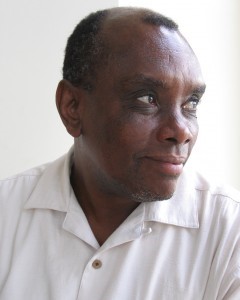
Father Joseph Philippe
Already there was a message on my answering machine from the priest. Here is what his message said in a heavy Haitian accent:
“Hello, my name is Father Joseph Philippe. I am a Haitian Spiritan priest in Haiti. I want to thank you for your willingness to come to Haiti and work with my people. I want to congratulate you for your courage. You can be the Director of Fonkoze, Haiti’s bank for the organized poor!”
I was totally in shock. How could he accept me sight unseen? How could he give me a position he knew and I knew I didn’t qualify for?
In any case, I decided to move forward. The Richmond Diocese didn’t have any places left in their delegation, but they referred me to the Norwich Diocese of Connecticut. So I signed up for their delegation. It was a 7-day trip, and Father Joseph agreed to meet me on the last day before I returned.
The delegation gave me a wonderful opportunity to visit the projects of this diocese to help the poorest in Haiti. We stayed in Port-au-Prince but traveled a bit in the countryside. I met some wonderful people, learned about the Haitian struggle for democracy, and witnessed for the first time in my life a degree of poverty that was heart wrenching.
On the last day, I went to meet Father Joseph. He had invited me for lunch but I arrived very late because I got totally lost; there was very little food left on the table of these hungry priests. I couldn’t understand a thing they were talking about of course, but I could tell they were talking about the political situation in the country. Fr. Joseph invited me to eat the leftovers, but asked me not to tarry because we had a lot to do!
Following lunch, we met on his terrace. He sat me down in a chair, pulled up a 1950s metal typewriter stand with only one wheel left on it, placed paper and pencil on the stand and then said, “Ok, let’s get to work!” Falling into the mode of a consultant, I asked him to please explain what he was trying to accomplish and why. In the next 20 minutes, he convinced me that he had more “vision” than all my clients in Washington, DC put together. He effectively explained to me everything I needed to know about Haiti, about the Haitians living abroad, and about his dream to build a bank the poor in Haiti could call their own. He didn’t want it to be a project or a program. He wanted to build a national institution with branches all over the country so that all of those living in poverty could participate in the economic development of their country.
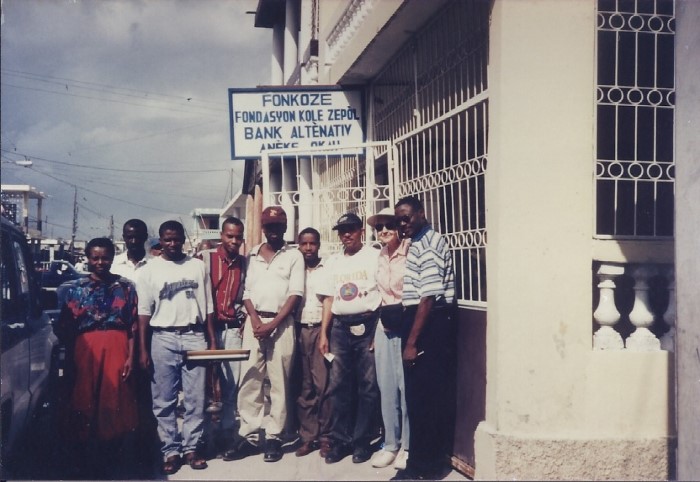
One of the first Fonkoze banks
I knew immediately that this was a powerful leader of his people, and that more than anything in the world, I wanted to come and help him. He asked me when I could be there. I said probably in May because since it was January now, I would need time to go home, sell my house, get my business affairs in order, and close out some projects I had ongoing. He said that would work just fine because he wanted to have a meeting in Miami in March, and I could help him put that together. I asked what the meeting was. He explained that he wanted one Haitian representative from every Haiti community in the U.S., the Caribbean, and Canada to come to Miami to discuss his project.
I explained that he was the first Haitian I had ever met, so how would I do that? He pulled out a list of every Haitian he knew living in the targeted areas along with their phone numbers! I asked what kind of budget we would have to work with. He said he had NO money whatsoever! I asked how we would get the people to the meeting. He responded that once they heard what the meeting was about, their communities would find a way to get them there. I asked where we would have it. He said he knew there were a number of Catholic universities in Miami, and I should negotiate the space. He suggested St. Thomas University.
As I was leaving, feeling that we had made a deal, he stopped me and said, “Oh, I forgot to tell you something. I don’t have any way to pay your room and board while you are here.” I said, “What? You mean I have to pay to come and help you?” He put his hand on my forearm, looked me deep in the eyes, and responded, “I think you’ll find a way.” I asked how much money he thought I would need and he said, “Oh, I think $12,000 would do it.” I asked how he came up with that number and he explained that he thought I would need $4,000 for a place to live, $4,000 for food, and $4,000 for transportation.
I left feeling totally ambivalent. I knew I wanted to do this, but I had no idea how I would raise the money, and I certainly didn’t have it myself. Coincidentally, on the plane home, I sat next to another American woman and asked her what she was doing in Haiti. She said she worked for the Ministry of Money and described how she brought wealthy women to Haiti to invite them to come to terms with the face of extreme poverty in the country. Then she facilitated sessions with them to help them discover what their wealth meant in the face of that poverty. I told her about this crazy priest I had met and what he was asking me to do. She came out with a surprising comment. She said, “Anne, what you are about to do will transform your life forever. Everyone in your life today wishes they could do something like this, but they don’t have the circumstances or the means to do it. All you have to do is ask them to accompany you on your journey.”
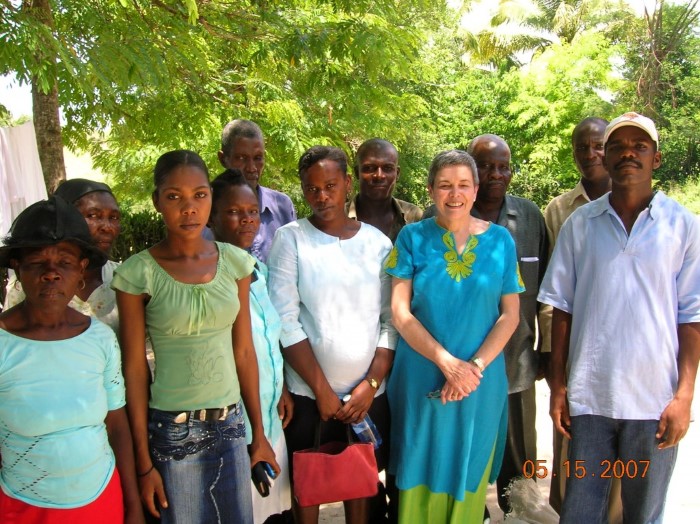
With Fonkoze clients and community members
I had no idea what she meant at the time, but I went home and thought long and hard about what I had seen and heard during my trip. One night, I woke up in the middle of the night, got out of bed, and wrote a long letter to 70 of my closest friends, family, and colleagues. I explained to them what I wanted to do and told them about this crazy priest, but I never asked them for money. I mailed the letters out and within just a day or two, people started sending me checks. I really couldn’t believe it, but I was able to finance my trip that way.
The conference in March 1996 was a big success. In fact, we had Haitians from the East and West coasts of the U.S., from Canada, and from a couple of Caribbean islands. But along the way, I started hearing about something called microcredit—providing small loans to very poor people so they could open a little business like selling mangoes in the local marketplace. I asked Father Joseph if he didn’t think we should get some experts in microcredit there to help us, and he agreed. But of course, we couldn’t pay them, so once again I found myself convincing them of the need to come. In the end, we did have three experts come, and we all learned a lot about what we were about to do. In fact, we raised our first funding at the conference. One of the experts gave us $10,000 and a Haitian in Canada raised $15,000 for us. We were on our way with $25,000.
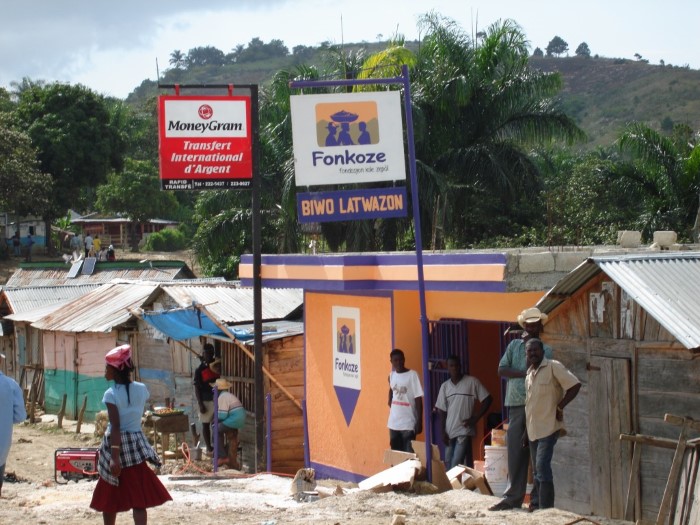
A typical rural Fonkoze branch
What is your next act?
I did arrive in Haiti in May, 1996, at the age of 46. Father Joseph immediately got two Haitian teenagers to begin teaching me Creole three hours a day, five days a week. Neither of them spoke a word of English! Although I had taken a year or two of many different languages in high school, college and graduate school, I had never learned to speak any of them. Haitian Creole was the first language I ever became fluent in!
Every weekend, Father Joseph would load up his little double cabin pick-up with more people than one could imagine and we would head off to the farthest reaches of Haiti, where it seemed the poverty was even more extreme. But everywhere we went, Fr. Joseph would be met with crowds of one to two hundred barefoot Haitians wanting to hear about this bank for the organized poor. And he told them that the Holy Spirit had sent me to help him grow this bank. (Many years later, I had to admit that I had no other explanation for how it had all happened.)

Father Joseph preaching in Fondwa
Although I had grown up as an Episcopalian, as an adult I had never had an active religious or spiritual life. Part of the transformation I went through in Haiti was to learn to respect people of faith who were actively working to eliminate poverty. I was continually being told that I was doing “God’s work” or that the Holy Spirit was active in my life. I came to appreciate that deeply. Today if people ask me what religion I am, I say I am “Haitian Catholic” because it was in Haiti that I learned what it means to love God.
Rather than staying for one year, I stayed for 17 years—I left in 2013 to return to the DC area to play a larger role in the lives of my three grandchildren. It was an incredibly difficult transition for me because life in the U.S. is so very different than life in Haiti. If it hadn’t been for my desire to be with my grandchildren, I’m not sure I would have ever done it. But the way I looked at it was that I had raised my son for 17 or 18 years and then I had to let him go. Now I had raised my second child, Fonkoze, for 17 years and it was time for me to let it go. I had a new job to do: participating in raising my grandchildren. By then, they needed me more than Fonkoze did.
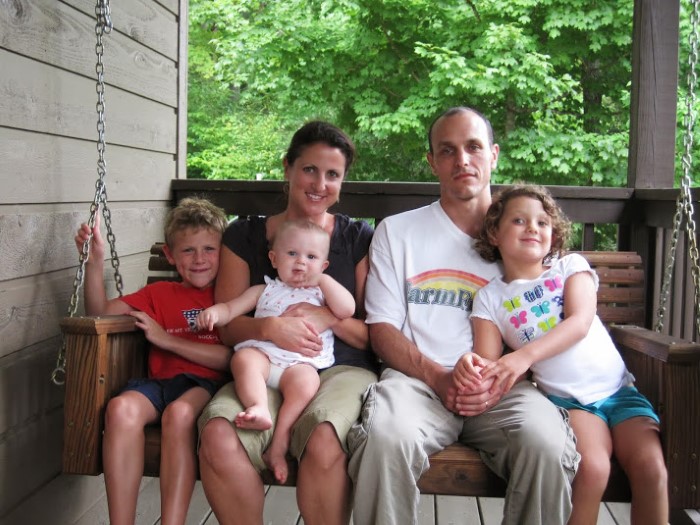
My son with his wife and kids
But by the time I left, our bank, Fonkoze, had become a worldwide phenomenon. We had opened 46 branches in all regions of the country and had close to 900 employees. We had 60,000 women who were borrowing from us, and some 250,000 savers. We offered not only a full range of banking services—savings accounts, loans, money transfers, and insurance—but we also offered literacy training, business skills training, sexual and reproductive health training, and training in children’s rights and environmental protection. And my friend on the plane back in 1996 was right—it had transformed my life.
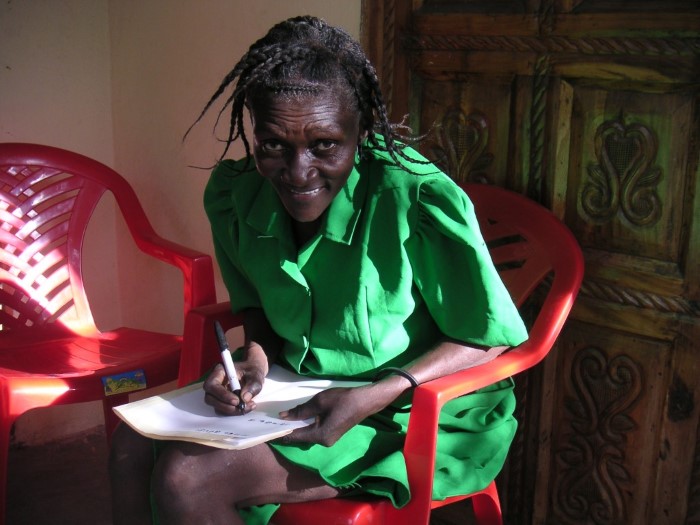
Janet just learned how to sign her name
How hard was it to take the plunge? How did you prepare?
It was difficult to make the move. The hardest part was selling my house, most of my furniture, my car, etc. But the freedom that came with “downsizing” was so liberating. I have never had a dollar of debt since then, despite working as a volunteer for 7 of the 17 years I was there.
How supportive were your family and friends?
My siblings and I have never been that close and for the most part, they were neutral at best. But eventually, my oldest brother learned about microfinance, and through the efforts of his wife, became very supportive. Once I won an award in his hometown of Dallas, and he hosted a dinner for everyone and introduced me at the event.
My mother really didn’t want me to go to Haiti and continually asked me to come home, but she was very supportive in her own way. I did come back from time to time to visit her in Florida. She died in 2009.
My son, Corey, was very supportive. He was going through a transformation of his own at the time: He wanted to become a Zen Buddhist priest! He came to visit me in Haiti soon after I arrived and Father Joseph had a profound effect on his life. Corey decided that he too wanted to live in solidarity with the poor. He went on to a Japanese Zen Buddhist monastery and became very involved in something called “engaged Buddhism.” Ultimately he decided to leave the monastery and join me in Haiti. He stayed in Haiti for about two years, and then went back to the U.S. to get an MBA and worked for a while with Fonkoze USA! Today he is an active Episcopalian with a beautiful wife and three wonderful children.
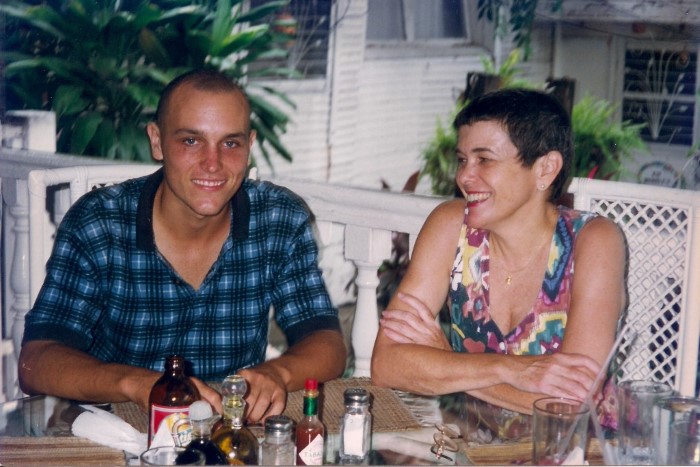
With my son Corey in Haiti
What challenges did you encounter? Were there times when you thought about giving up?
I did think about giving up in the early years I was in Haiti, but only a very few times. We were making so much progress, and I had such a good working relationship with Father Joseph that it seemed there was very little we couldn’t accomplish. And throughout those early years, we found more and more people who wanted to support us. As the situation got more and more difficult in Haiti, the network of supporters just seemed to keep growing. So I really felt “supported” even when the challenges seemed greater than I could manage.
For instance, in the year 2000, one of our employees was kidnapped and murdered from our office by 10 men dressed in Haitian national police uniforms. Another time, we were robbed by two men with guns—one of whom was a Haitian deportee from the United States who had been a client! There was the time we lost a significant investment we had made in a vetiver business (a rare essential oil used in the manufacture of perfumes). There was also the year Haiti suffered from three hurricanes, one right after another. And, of course, there was the earthquake when we lost a number of employees and an even greater number of clients. Giving up just didn’t seem to be an option.

Fonkoze Headquarters after the earthquake
One would think it would have been enormously difficult for me to be living as I did. For my first four years in Haiti, I lived in a house that had no running water (bucket baths were the norm), no electricity (though eventually I got batteries and an inverter to supply me with power), no furniture except a bed, a table and 4 chairs, no refrigerator (just a cooler) and nothing that you would call a kitchen. I didn’t even have a closet. I remember putting nails in the wall and hanging one dress on each (in those days, Haitian women rarely wore pants). For reasons I don’t fully understand, it was not difficult for me to get used to these surroundings.

Taking board members to meet our clients
The one thing I found that I couldn’t live without was ice—who would have thought? But it was hot in Haiti, and I’m not really that keen on hot drinks, so I felt like I was always looking for ice. Of course, ice was the one thing you couldn’t trust. I had to buy it, but who knew if it was made with safe water? At first I was ok with a cooler, but ultimately that turned into a need for a refrigerator, which of course needed electricity. So that turned into a need for batteries and an inverter. Gradually, VERY gradually, I found a way to get access to all these things and was reasonably comfortable. I never did get air conditioning in my home, but that never really bothered me – a good fan was all I needed. And, the result of not having air conditioning in my office for the first 10 years or so was that I got a beautiful collection of paper weights—how else was I to keep the papers from flying off my desk when the fan was blowing so hard? It seems no one has a need for paper weights anymore, but they are so beautiful! What a shame they are, for the most part, gone from our lives.
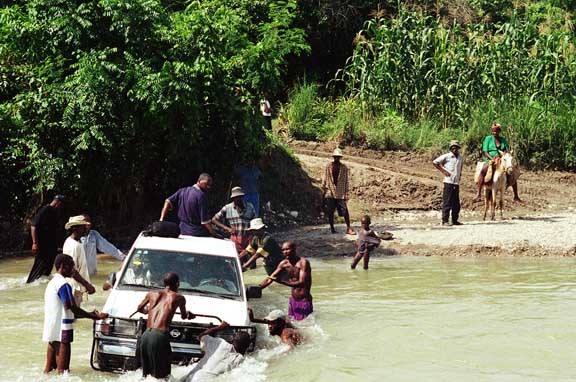
Infrastructure problems in Haiti
What did you learn about yourself through this process?
I learned that I was happiest and most fulfilled when I was a part of the struggle against poverty and injustice. My life had meaning. I had struggled against depression for a good part of my life—but I was never depressed when I was in Haiti. There I was part of something so much bigger than myself, and it just felt like it was where I was supposed to be.
What advice do you have for those interested in leaving it all behind to go volunteer for one year or more in a foreign country?
Do It! It was the best decision I ever made in my life, but I really got lucky. It could easily have turned into a disaster, but fortunately Father Joseph turned out to be a real leader of his people. I took a tremendous number of risks in making my decision, and there is no doubt that I was blessed that it all worked out so well.
Today, I am very glad that I didn’t go into the Peace Corps, even though everyone I know who did it loved it. But for me, it seemed so much better to work for a leader of his people, rather than as an agent of the U.S. government. But there are so many opportunities today for people to do something like I did: For example, many corporations offer opportunities like this to allow their employees to volunteer in another country. We were constantly receiving people who wanted to come and work with us. All we asked is that they come for a minimum of three months (though we preferred six months) and be able to support themselves. We had mid-career accountants, photographers, MBAs, architects, bankers and experts of all kinds who applied to come work with us, and we were usually able to accept them.
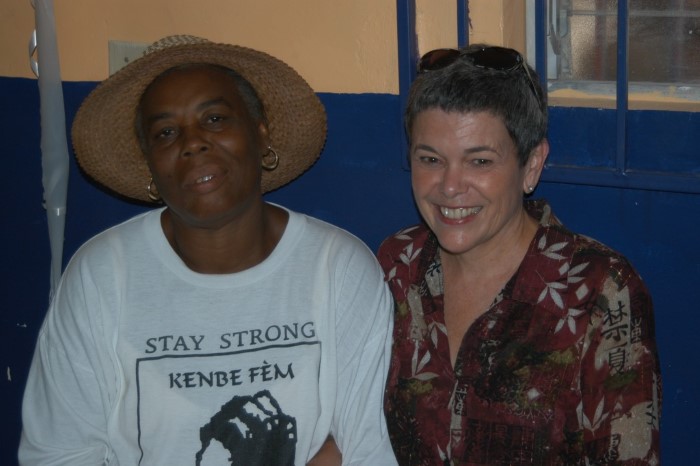
Working with a client
What advice do you have for those interested in delving into microfinance? What resources do you recommend?
The field of microfinance has grown rapidly over the years. There are plenty of training programs for practitioners, for investors, and for donors. But I think it’s too late to really start something brand new. There are thousands of MFIs today and many are still quite small. Consolidation of them is the trend. In addition, the digital revolution has hit microfinance as well so the field is becoming much more complex than it was when I got started.
Women’s World Banking and the Wharton School of Business offer leadership training for emerging leaders in the field. Accion International and Harvard Business School offer a similar program at Harvard.
Here are a few good books about microfinance and Haiti:
Microfinance
The Business of Doing Good: Insights from One Social Enterprise’s Journey to Deliver on Good Intentions by Anton Simanowitz
More Pathways Out of Poverty by Sam Daley Harris
Small Loans, Big Dreams: How Nobel Prize Winner Muhammad Yunus and Microfinance are Changing the World by Alex Counts
Freedom From Want: The Remarkable Success Story of BRAC, the Global Grassroots Organization That’s Winning the Fight Against Poverty by Ian Smillie
Portfolios of the Poor: How the World’s Poor Live on $2 a Day by Daryl Collins and Jonathan Morduch
Haiti
Breath, Eyes, Memory by Edwidge Danticat
The Uses of Haiti by Paul Farmer and Noam Chomsky
Haiti After the Earthquake by Paul Farmer
Mountains Beyond Mountains: The Quest of Dr. Paul Farmer, a Man Who Would Cure the World (Random House Reader’s Circle) by Tracy Kidder
The Big Truck That Went By: How the World Came to Save Haiti and Left Behind a Disaster by Jonathan M. Katz
Haiti: The Aftershocks of History by Laurent Dubois
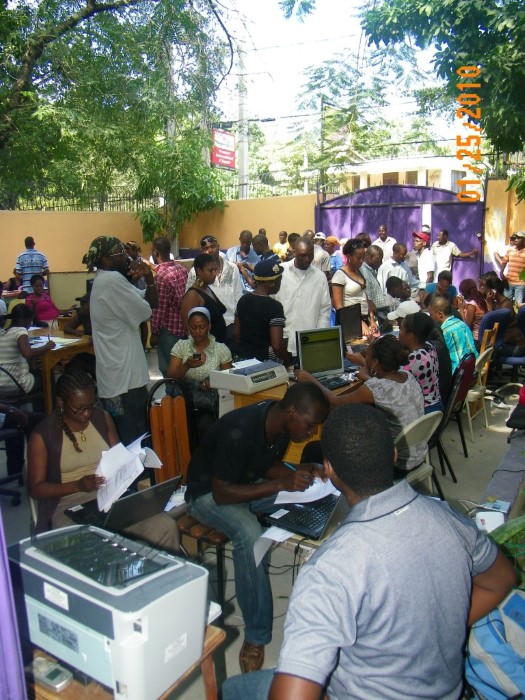
Serving clients in a courtyard after the earthquake (the building was destroyed)
What’s next for you?

My grandchildren
I live in the Washington, DC area close to my son’s home and my three beautiful grandchildren. Today I live in a studio apartment that, while it has all the amenities one could want, is about the same size as the little apartment I had in Haiti. I have no car. I try to continue to live a simple life and do all I can to find ways to support the very poor.
I really wanted to take on a position with much less stress and fewer stakeholders with competing demands. Fortunately, I was lucky to find a wonderful position working with 10 global microfinance leaders who sincerely want to transform the industry so that it can reach its potential in the struggle against poverty. In 2011 they formed the Microfinance CEO Working Group and today I am its Executive Director. Instead of one microfinance institution, I suddenly had 250 to worry about! But I was working with people whom I respected for a goal that I could believe in.
I visit Haiti whenever I can. Father Joseph and I are still very close. We talk all the time and whenever he is in the US, we spend time together. He has a lot of other projects, some of which I am going to start helping him with after the new year, when I’m hoping my life will calm down some.

Working side by side with Father Joseph
Contact Anne H. Hastings at annehastings1775@gmail.com
For information about Fonkoze or to support Fonkoze, visit their website.
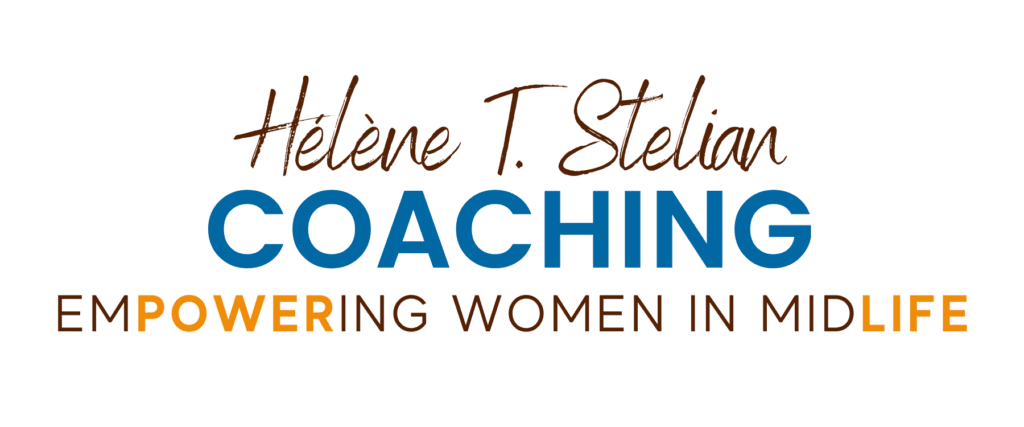





What a story! Inspiring and on going. I am in awe!
Hi Anne,
I know I have heard your story many many times, but the truth of the matter is that I am always amazed by it and your courage to help others as well as my haitian brothers and sisters.I am very grateful!
Wishing you best in your new endeavor.
Nelson
Hello, Nelson! It’s wonderful to hear from you. Leigh keeps me current on all the changes in your life. Thanks for commenting! Anne
Hello Haralee! Thank you for your comment. I loved your post on menopausal insomnia, which I should be long past. But it seems to hang on . . . and on . . . and on.
Rejoice in the Lord alway: and again I say, Rejoice. Let your moderation be known unto all men. Forasmuch as ye know that your labor is not in vain in the Lord.
Hello Anne,
Great read. Very inspiring. After reading this, one cannot be forever greatful and thankful for the legacy that you had left for Haiti and for its people. You have always been a model to me and I always look up to you. I personally want to thank you for giving the opportunity to be part of this and to move forward in the Organnization. Once again Thank you and I wish you the best of luck in your new life, you’re definitely blessed. Oh by the way your grandchildren are so adorable 🙂
Hello, Fredler!
How wonderful to hear from you — one of the many employees of Fonkoze who remain committed to its future. Fredler was one of the 30-some employees that we were able to send to Duquesne University in Pittsburgh, PA for one year under a scholarship provided by the University. As part of his commitment to Fonkoze, he promised to come back to Haiti and continue to work for Fonkoze for at least 3 years. I’m pretty sure he’s passed his 3-year mark and is still there.
I didn’t mention in my story that one of the things I was most proud of that Fonkoze was able to accomplish was to give so many jobs to so many people — over 900! This is in a country where the unemployment rate is above 70%. In fact, in many of the rural areas where we set up branches Fonkoze is the largest employer in the community. Haitians desperately need and want jobs. Fredler is a good example of someone who wanted to work hard, further his education and give back to his people.
Keep up the good work, Fredler! Your country is counting on you!
Anne
What does Fonkoze do?
Dear Renee,
Fonkoze is Haiti’s largest microfinance institution. But it is an unusual microfinance institution in the sense that it not only provides Haiti’s poorest people with a full range of financial services — savings, loans, money transfer receipts, and when I was there, insurance, but it also provides educational and health care services. Haiti is the poorest country in the Western Hemisphere and more than 50% of its people are living on less than $1.25 per day. Fonkoze is their bank. When other banks don’t want to service them at all, Fonkoze is there for them. When I arrived in Haiti, more than 50% of adults didn’t even know how to read and write! So Fonkoze offered literacy services. Fonkoze always looks at the whole client — and just giving them a loan and a savings account is not enough. They need many different types of services if they are going to lift their families out of poverty. And that’s what we want to do — accompany the people as they lift themselves out of poverty and build the economy of their country.
Just sending you love, miss working shoulder to shoulder, building things with you. There is always more to build, dear friend.
How nice to hear from you, Laura. I’ll be in touch soon! I miss working together as well! Stay strong! Anne
God works in mysterious ways indeed. So glad you answered the call Anne ! Stay blessed !
Thank you for your blessing, Marie. I am doing my best to find other ways now to continue to accompany those who are most impoverished. Blessings on your day! Anne
Dear Anne
Thank you for all that you have done and continue to do. Your courage and your effectiveness are truly amazing. Both Diane and I are amazed and humbled by all that you have accomplished. Thanks also for letting your business partner, John Scanlon, remain here to serve as a powerful leader, mentor and friend to us and many others.
Thank you again for your service and leadership. All our best wishes for a great holiday season, Dennis
Dear Dennis,
Thank you so much for your note. I really appreciate it. But I should clarify one thing: I didn’t “let” my business partner, John Scanlon, remain in the U.S. I didn’t EVERYTHING in my power to convince him to come help me in Haiti. But he was totally resistant. This is one of the biggest failures of my career.
Of course, he did help me a lot from here!
Warmest wishes for peaceful and joyful holiday,
Anne
Dear Anne,
Great to read your story. From humble beginnings in Winchester, VA to changing lives in Haiti.
I met you on the roof of Matthew 25 Guest House in P-A-P in 2005 on my first trip to Haiti. We were introduced by Dave and Loretta O’Donnell and Scott Rohr, who founded our twinning ministry in Dos Palais. It was a memorable evening for me. I haven’t stopped going back on an annual basis since that visit and am encouraged by people like you.
Next visit is 2/10 to 2/18/16. Please drop me a line and let me know if I can help on any projects. We have a lot to catch up on!
Best,
Dear Dan,
How nice to hear from you! I am very excited to learn that you have been going back to Haiti annually since 2005. I am a strong supporter of the Haiti Parish Twinning program — it has done so much good for so many people.
I am now based in the U.S. but return to Haiti whenever I can. Let’s hope our paths do cross again!
Warmest wishes,
Anne
Thank God he put you to the test. And you came through i love your job.